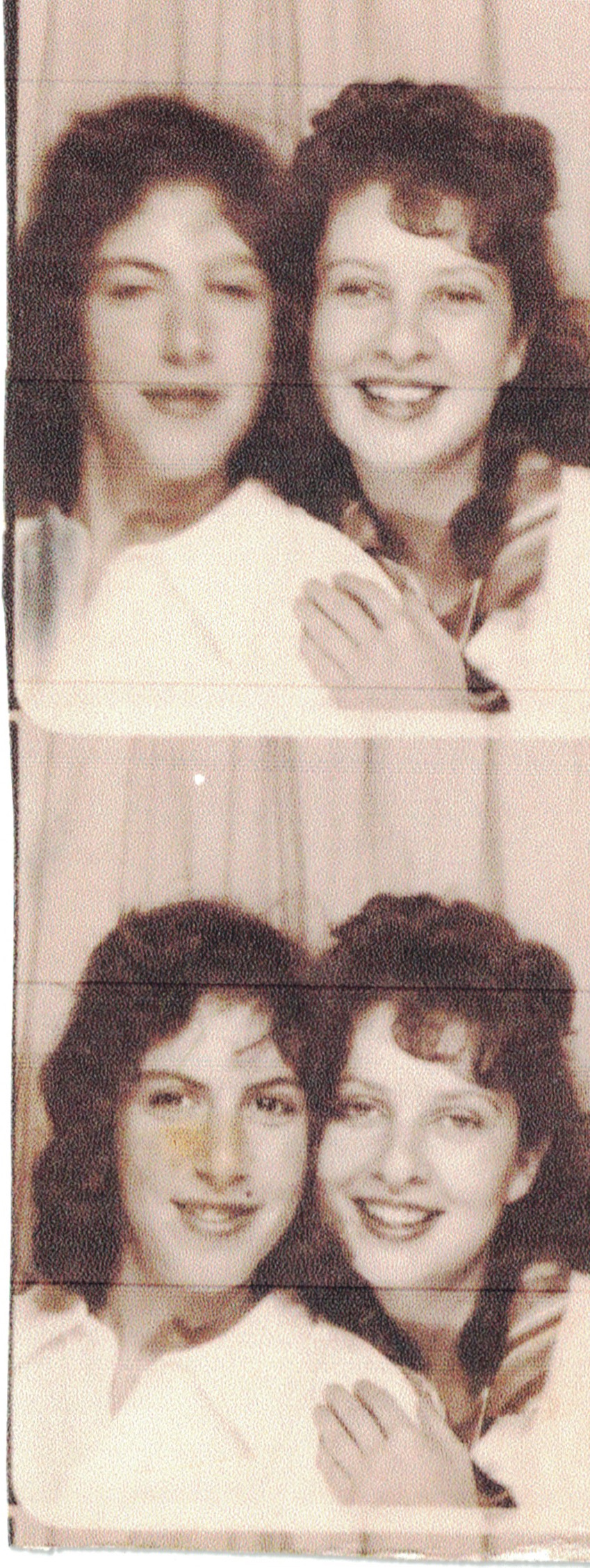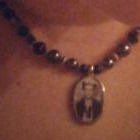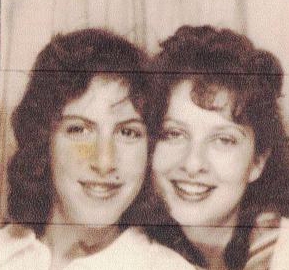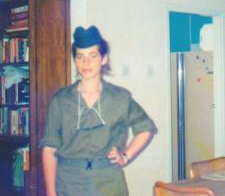Gloria Miller was a liar. That’s one reason I remember her, from way back in 1958 when she joined our ninth grade class at Peekskill High, mid-term. We shared English, gym, lunch and music. Miss Hill, our music teacher, introduced her: “Let’s welcome Gloria who has moved here from New York City.”
Gloria, at fourteen, was five-foot-eight with coarse black hair worn in an untidy ponytail, and pale, pimple-spattered skin. Her heavy breasts and hips were accentuated by a pink angora sweater with bright pink lipstick to match, and a tight black skirt. A man-sized class ring hung from a chain around her neck. She looked nothing like me with my neat pageboy haircut, straight, but not overly tight skirt, and a pullover, nothing like Sara either, with her ponytail, button-up blouse and full skirt.
Kids can be cruel and we were. Richie Holt, a tense, skinny kid with lots of meanness in him nudged his side-kick, Harry Frost. They snickered at Gloria until Miss Hill gave them a look, and they quieted down. Meanwhile every girl in the room eyed Gloria like she was a foreign object. My best friend, Sara Wexler and I exchanged significant looks of astonishment, while rolling our eyes.
One thing about Gloria, aside from being overweight, broken out, and peculiar looking was, she could sing! When she belted out “I’m gonna wash that man right out of my hair” during tryouts for the school production of South Pacific, everyone’s mouth dropped open at her big rich voice. Miss Hill was in heaven having a student with talent for a change.
“You sure can sing,” I said a bit enviously when tryouts were over and Gloria fell into step with us on the way to the school cafeteria.
“Thanks,” she smiled, accepting the compliment and showing large horsey teeth. “Actually my dad owns a glamorous nightclub in New York City’s theater district. I entertain there on weekends. In fact, I was recently approached by a talent scout,” she said. “I may end up on Ed Sullivan.”
Sara and I, impressed by her talent and sophistication invited her to sit with us at lunch.
“This is my boyfriend, Johnny,” Gloria confided, pulling out her wallet to show snapshots of a movie-star handsome twenty-year-old in a West Point uniform, the moment she’d set down her tray. “We met through a friend,” she said, touching his class ring tenderly, “and in spite of our age difference it was love at first sight.”
A small wisp of suspicion entered my mind when she said that – why would a twenty-year-old West Pointer choose Gloria? – but I brushed it aside when she hinted at fixing us up with two guys in Johnny’s class.
“You and Sara are way more mature than the other girls in ninth grade,” she assured us. “An older boy would go for you – a triple date, even,” she said, dangling the carrot. Peculiar looking or not, Gloria became our new best friend. We ate lunch together every day, shared confidences about boys and spoke on the phone in the evening after school.
Sara and I were boy-crazy that year. We whispered, giggled and flirted in school with any cute boy whose attention we could attract, with little success. (The boys we did interest were such social non-entities we ignored them.) Sara, freckled, flat-chested, and hipless was no knock-out. I had a shape and wore the most form-fitting clothes that passed my mom’s inspection to prove it, but I also wore an ethnic nose my face hadn’t yet grown into, and braces on my teeth. We were two ugly ducklings, longing to be swans.
The popular girls in ninth grade were Jill Shuster and Louise Allen, best friends, both gorgeous; a curvy redhead and a tall slim blond. Trendsetters, they wore fashionable DA haircuts, matching cashmere sweaters, white loafers with nickels set in front, and bobby socks. They always had boyfriends, chosen from the most popular, sport-playing boys at school. Jill’s latest was Jimmy Werner, a senior; his class ring hung from a chain around her neck.
What Sara and I hated most about Jill and Louise and their whole snooty clique was that they completely ignored us. Not in a mean or deliberate way either; they just found us too uninteresting to notice. We pretended not to care but eyed them enviously, trying to emulate their boy-appeal.
Our friendship with Gloria – although we would have denied it – was based on what we hoped to gain by befriending her. Gloria spoke of Johnny constantly: of his romantic letters and phone calls, and stolen kisses, and a dance they attended at West Point, where she wore a rhinestone-trimmed evening dress and her mom’s black silk shawl. Sara and I hung on her every word and waited eagerly to be fixed up with Johnny’s friends. (A college guy trumped a high school senior, no question about it. Wouldn’t Jill and Louise sit up and take notice then?)
One evening, a month or so later, my mom and Mrs. Miller met at a PTA dinner and got friendly. My mom was invited to lunch at the Millers’ house the following week. I waited impatiently on the livingroom couch looking out the window awaiting her return. The moment she walked in the door, I pounced.
“Well?” I said. “I want all the details.”
“Details about what, dear?” my mom asked, looking surprised.
I sighed impatiently. Moms could be so annoying. “I want to hear all about their lavish split-level home, Gloria’s adorable twin brothers, pure-bred, prize winning dog, and her handsome boyfriend who attends West Point.”
“Twin brothers? Prize winning dog? Boyfriend?” My mom’s brow furrowed in bewilderment. “Honey, you must have misunderstood what she said. Gloria’s an only child, like you. She has no boyfriend. She’s fourteen; that’s too young to date.”
I rushed to the phone to tell Sara about this new turn of events.
“You’re never going to believe what I just found out about Gloria!” I said, curling up in my dad’s easy chair, twisting the phone cord as I spoke.
“What on Earth happened?” Sara asked.
“Everything Gloria told us was a lie!” I said bitterly.
Shocked and disappointed, we hashed over the details until the puzzle pieces fit. The Millers did own a nightclub, but Gloria didn’t perform there. There were no twin baby brothers, no black-and-tan Doberman who’d protected Gloria from a gang of New York pickpockets. No Ed Sullivan either. Worst of all, we realized regretfully – there was no Johnny, and there were no handsome single West Pointers waiting to date us.
“No West Pointers either?” Sara exclaimed. “You mean she strung us along so we’d be her friends; how shallow!” Sara’s voice was indignant. I imagined her ponytail bouncing around her shoulders as she shook her head in disbelief.
Outraged by Gloria’s deception, we confronted her at lunch the next day in the school cafeteria, over bowls of tomato soup.
“You lied.” Sara hissed, glaring, crossing her arms across her chest.
Gloria’s cheeks reddened as though she’d been slapped. Fidgeting in her seat, her tear-filled eyes darted around the room avoiding ours as, one by one, she attempted to explain away her lies: 1) she was underage, so her folks can’t admit they let her sing at the club; 2) her brothers, Bart and Barry, died suddenly in the night when they were six months old, but she can’t accept it and pretends they’re still alive; 3) her dog King was stolen by dog-nappers, and never returned even though her dad paid the ransom; and 4) Johnny left her for a college freshman – she can’t accept this either, and so, still wears his ring.
It was quite a story, but this time we didn’t buy it. In unison we got up from the table and marched away, leaving her sitting alone. Sara and I spent hours on the phone that night planning how to expose Gloria’s lies to the entire ninth grade. We’d make her sorry she’d deceived us – mean kids like Richie Holt would have a field day with this new information. Everyone would laugh at her and know she was a liar. She’d be shamed, friendless, alone. We wanted to see her slink down the hall hanging her head! We might have done exactly that, but later that evening, while doing my homework, I overheard my parents, in the living room, discussing the Millers.
“Ellie Miller called today,” my mom told my dad. “She said Gloria is a pathological liar.” My mom sounded shocked. “She tells lies, like she believes they’re true. Sam and Ellie have been humiliated everywhere they’ve lived by the stories she tells people. She sees a therapist every week, but she continues to make up the most outrageous stories. Isn’t that sad? And apparently our daughter was taken in by her lies.”
I played Elvis in my room, and considered this information. Curious, I checked my dictionary. Pathology was the study of the nature of disease. A lie was a deception, told with intent to deceive. “She tells lies like she believes they’re true,” my mom said.
I couldn’t understand that. Even if Gloria told lies like she believed they were true – she had to know they were lies, that she might be found out, that there would be repercussions. Maybe, I thought, she began lying because even though she can sing, she knows she’s fat and homely, and wanted to seem more interesting so we’d like her.
How would it feel? I wondered. To crave acceptance and attention so badly you’d make up brothers, and boyfriends, and dogs, and pretend they were real to impress other people. That must be why my mom said, “Isn’t that sad?” – not, “isn’t that bad?” And my dad agreed with her.
I almost thought better of it the next day at school, but at lunch, Gloria joined us and confided that she’d heard from Johnny. “He still loves me,” she said, clutching her throat like a soap opera star.
After school was out that day, Sara and I confronted Gloria in the girl’s room. It was four o’clock; everyone else had gone. She was combing her hair in front of the wall mirror, looking large and lumpy in a bright scoop-neck sweater and pleated shirt. Sara and I stood at the sinks, watching her, arms folded, eyes narrowed – we were the wolf pack, closing in.
“That’s not what I said,” she said repeatedly, her eyes never quite meeting ours. “What I really said was...”
But we kept at her, challenging lie after lie, our enraged voices echoing in the silent girls room until she crumpled. Until she stopped the pretenses and cried: great gulping sobs, with tears running from her eyes and snot dribbling from her nose. “I only wanted you to like me,” she repeated over and over, between deep shuddering breaths. “I only wanted you to like me.”
Sara and I exchanged uneasy looks. I felt like I should reach out and comfort Gloria somehow, but I couldn’t make myself do it. Sara gestured toward the door with her eyes, and mouthed the words “Let’s go.”
“It’s okay.” I told Gloria, offering what I could. “We won’t tell on you.” Then, guilty, embarrassed, mumbling about needing to catch the school bus, we turned and fled, leaving her standing there looking down at the girl’s room sink.
“She made fools of us!” Sara sputtered on the bus ride home. “Why did you say we wouldn’t tell?”
“Because… we were dishonest too… and unkind,” I said slowly, still figuring it out. “We let her think we were her new best friends – when we really wanted dates with West Pointers.”
“Well, yes, that’s true,” Sara said reluctantly. “But even so….”
We fell silent after that and sat looking out the window. And all the way home I felt so sorry for Gloria Miller – just for being who she was – I wasn’t mad at her any more.
But we were fourteen; compassion only went so far. We didn’t cut her dead after that but we let the friendship fizzle. We made new friends, girls like us, without boyfriends. We sat with them at lunch and didn’t invite Gloria to join us even though she watched us with hurt eyes from her lonely table.
Still, we kept our promise and never told on her either.
Lynn Sunday is an artist-turned-writer who lives with her husband and two rescue dogs in a coastal community near San Francisco. Her writing appears in multiple anthologies of Chicken Soup for the Soul; The Times They Were A-Changing: Women Remember the 60s and 70s; and was awarded first prize for creative nonfiction in the Soul-Making Keats Literary Competition, 2015.






